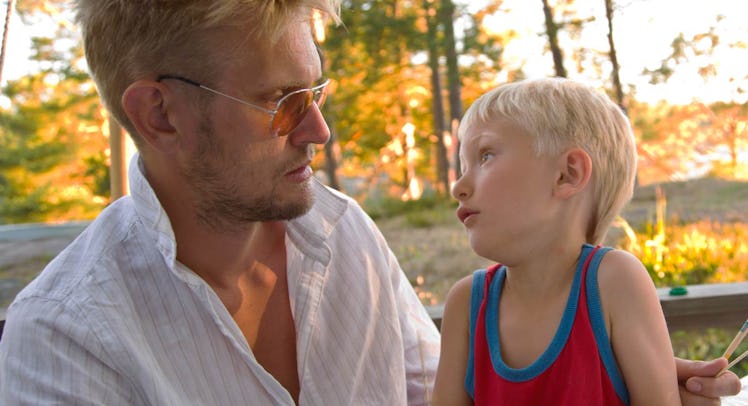How to Admit to a Kid That You Know Nothing About Anything
Children think you know everything. In fact, you know next to nothing. Here’s how to break the news.

For a brief, magical period in a child’s life, they believe their parents are omnipotent. They can be told practically anything and will accept complete bullshit with a solemn nod. Then, after teaching their kids to speak and before teaching them to drive, parents start to suspect that their credibility is on the wane. There’s a reason for this. It is. Kids figure out the game on their own if their parents don’t actively point out the yawning gaps in their basic knowledge of how the world works. Wikipedia and the omnipresent smartphone have delayed the realization, but it’s still inevitable and best managed as a conversation rather than a slow, disappointing reveal.
Unfortunately, there is no way to know exactly when to time the first conversation about fallibility or intellectual blindspots. There is no scholarly consensus on when precisely kids begin to understand their parents’ limitations. It’s safe to assume that there is a bell curve and that some parents (you know, the smart ones) are able to hide the truth for longer than others. But, data or no, make no mistake: The truth will out. Whether it happens over a series of conversations or in a flash of extreme honesty, parents need to be forthcoming about their ignorance.
Middle school teacher Heather Wolpert-Gawron, author of Just Ask Us: Kids Speak Out on Student Engagement, knows this all too well. As a teacher, her students look to her for answers and certainty. What Wolpert-Gawron has come to understand is that telling a kid she doesn’t know the answer is often more powerful than having an answer. There’s a way to have that conversation that empowers a child while teaching them about honesty and integrity.
“There’s no way I can anticipate everything kids are going to want to know about. And I’m not the keeper of the knowledge in my classroom or in my household,” Wolpert-Gawron says. “My job is not to be the archive of knowledge; my job is to help them begin to build their own independently.”
Wolpert-Gawron understands parents might be reluctant to say they don’t know and give up their demigod status. After all, she’s in the education racket. But Wolpert-Gawron doesn’t encourage a rote model of education. She doesn’t teach students to regurgitate. She teaches students to learn, which is all about figuring out known unknowns. Adults may not know the average speed of a swallow, but they do know what they don’t know. And that’s something they should lean into — at least in the company of kids.
“Throw off your own insecurities here,” Wolpert-Gawron encourages. “Pretending to know it all does them a disservice.” What’s more helpful is helping them understand how to come to the answers themselves. “Confidence is great, but help them be confident in how they research, how they curate, and how they communicate what they’ve learned.”
The Four-Pronged Approach to Admitting You Don’t Know Something
- Serve as a model of enthusiasm, not disappointment, in order to get a child interested in investigating questions.
- Transform not knowing into lessons on helping children to understand how to come to answers themselves.
- Consider that it’s impossible for a person to be curious about things that they already know, and frame curiosity as a very good thing.
- Use investigation as a collaborative opportunity: “I don’t know; let’s find out together.”
Sometimes, she explains, it’s as easy as willful ignorance. She remembers a kid in her class who was an english language learner who had remained relative unengaged in her class. One year, Wolpert-Gawron brought 3D printers into her class. She had no technical knowledge about the printers and no plans to learn about them, except from her students. “Within day one, they realized I was not going to able to help them, nor did I want to,” she says. That meant, they had to take initiative. They did.
“One day, when my back was turned, one student began to disassemble one of the printers,” she remembers. It was her unengaged, quiet learner. A bit alarmed, she asked him what he was doing to the machine. “He explained that the temp sensor wire, or something, was something-something to the print head,” she says. “He’d emailed the manufacturer with the number of the printer the prior week, without thinking to tell me.” During that call, he’d discovered that the machine was still under warranty, order a new part, researched how to install it and was doing just that. He was suddenly excited to learn. “His enthusiasm was about the device and about being an expert in it,” Wolpert-Gawron explains.
Her story suggests that having an adult not knowing can actually be fun and inspiring to a kid. But often, parents need to be a model of that enthusiasm in order to get a kid on board the not-knowing train. Wolpert-Gawron suggests they revel in the opportunity. “Not only do you get to drop the pressure of being the authority in the room, but you get to model a joy in finding out answers,” she says.
That joy in not knowing is the important part. Importantly, it doesn’t need to faked. Consider the fact that it’s impossible for a person to be curious about things that they already know. Curiosity is a very good thing, so what’s not to be joyful about, Wolpert-Gawron wonders?
Still, there’s one thing left: What exactly a parent should say when a kid asks them something they don’t know anything about. Wolpert-Gawron has just the answer.
“I don’t know; let’s find out together.”
This article was originally published on